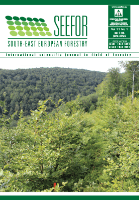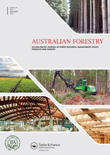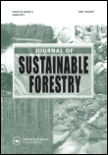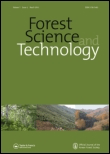
Journal of Forest Research
Scope & Guideline
Exploring the intricate relationship between society and forests.
Introduction
Aims and Scopes
- Forest Ecology and Management:
The journal focuses on the ecological dynamics and management practices of forests, addressing topics such as species composition, biodiversity, and the impact of various management strategies on forest health. - Climate Change and Environmental Impacts:
Research related to the effects of climate change on forest ecosystems is a core area, including studies on tree physiology, carbon dynamics, and forest resilience. - Forest Health and Pathology:
The journal publishes studies on forest diseases, pest management, and the impacts of invasive species, contributing to the understanding of forest health and sustainability. - Sustainable Forest Practices:
There is a strong emphasis on sustainable management practices, including studies on thinning regimes, forest certification, and community forestry initiatives. - Biodiversity and Conservation:
The journal highlights research on the conservation of forest biodiversity, including studies on genetic diversity, habitat restoration, and the role of forests in ecosystem services. - Technological Advances in Forestry:
Innovative methodologies, such as remote sensing, genetic marker development, and statistical modeling, are frequently featured, reflecting the integration of technology in forest research.
Trending and Emerging
- Impact of Climate Change on Forest Dynamics:
An increasing number of studies focus on how climate change affects forest structure, species distribution, and overall ecosystem health, highlighting the urgent need for adaptive management strategies. - Forest Ecosystem Services:
There is a growing interest in quantifying and valuing the ecosystem services provided by forests, such as carbon sequestration, water regulation, and recreational benefits, emphasizing their importance for policy and management. - Technological Innovations in Forestry Research:
The use of advanced technologies, like remote sensing and genetic analysis, is on the rise, enabling more precise and comprehensive studies of forest ecosystems. - Community and Stakeholder Engagement:
Research increasingly emphasizes the role of local communities in forest management and conservation, reflecting a shift towards participatory approaches in forestry. - Responses to Invasive Species:
Studies addressing the impact of invasive species on forest health and management strategies are becoming more prevalent, indicating a recognition of their growing threat to biodiversity. - Psychological and Health Benefits of Forests:
Emerging research on the psychological benefits of forest environments, such as forest bathing, underscores the connection between human well-being and forest ecosystems.
Declining or Waning
- Traditional Forestry Practices:
Research focusing on conventional forestry methods is less frequently published, as the field shifts toward more sustainable and innovative approaches to forest management. - Purely Descriptive Studies:
There is a noticeable decline in purely descriptive ecological studies, with a preference for research that includes experimental manipulation or modeling to address pressing ecological questions. - Single Species Focus:
Studies concentrating solely on single tree species are becoming less common, as there is a growing emphasis on community ecology and the interactions between multiple species. - Historical Forest Management Practices:
Investigations into historical practices, while still relevant, are receiving less attention in favor of contemporary challenges and future-oriented research. - Local Case Studies:
While case studies remain important, there is a trend towards broader, multi-site studies that can provide more generalized insights applicable to varying forest types.
Similar Journals

BALTIC FORESTRY
Unveiling Insights for Sustainable Forest FuturesBALTIC FORESTRY, published by the INST FORESTRY LRCAF in Lithuania, is a prominent academic journal that serves as a platform for disseminating cutting-edge research in the field of forestry. With an ISSN of 1392-1355, this journal is dedicated to advancing knowledge on sustainable forest management, ecological impacts, and resource conservation, among other vital topics. As of 2023, it has been categorized in the Q3 quartile for forestry in Scopus, indicating its solid reputation among peer-reviewed publications, ranking #95 out of 174 in the realm of Agricultural and Biological Sciences. BALTIC FORESTRY features contributions from researchers across the globe and encourages innovative approaches to solving contemporary challenges in forestry, making it an essential resource for professionals, scholars, and students alike. Although it operates under subscription-based access options, the journal's commitment to fostering academic discourse is unwavering, aiming to bridge the gap between theory and practice in forest science.

Forestist
Exploring the future of forest management and conservation.Forestist, published by AVES, is a pivotal open-access journal dedicated to the field of Forestry, providing a platform for researchers, professionals, and students to explore cutting-edge developments and research within the discipline since 1980. Operating from Turkey, this journal offers a unique opportunity for scholars to share their findings with a broad audience, contributing to the global discourse on sustainable forest management, conservation practices, and ecological research. With an impressive impact factor and a current categorization in the Q3 quartile for 2023, Forestist ranks among the essential resources in Agricultural and Biological Sciences, particularly within the realm of Forestry, as indicated by its Scopus ranking of #119 out of 174 journals. This publication is committed to fostering open access to knowledge, making research freely available while encouraging innovative studies that address the pressing challenges in forestry and environmental science.

Central European Forestry Journal
Empowering the forestry community through open access knowledge.Central European Forestry Journal, published by SCIENDO, is a pivotal platform dedicated to advancing research and knowledge in the field of forestry. Since its inception in 2009, this Open Access journal has provided scholars and practitioners with unrestricted access to cutting-edge research findings, promoting collaboration and innovation within the forestry community. Based in Poland, the journal serves as a crucial resource for researchers, professionals, and students alike, addressing critical topics relevant to the management, conservation, and sustainable utilization of forest resources. The journal holds a commendable Q2 ranking in Forestry, with a notable rank of 51 out of 174 and a 70th percentile in Scopus's Agricultural and Biological Sciences category. With converged publication from 2017 to 2024, the Central European Forestry Journal represents an essential avenue for disseminating knowledge and fostering dialogue in an increasingly important field.

SEEFOR-South-East European Forestry
Connecting research, policy, and practice for a greener future.SEEFOR-South-East European Forestry is a premier open-access journal dedicated to advancing knowledge in the field of forestry and environmental science. Published by the CROATIAN FOREST RESEARCH INSTITUTE, this journal has been operational since 2010, providing a platform for research that focuses on the unique forestry dynamics of the South-East European region. With an ISSN of 1847-6481 and an E-ISSN of 1849-0891, SEEFOR is recognized for its commitment to disseminating high-quality research that addresses critical issues in forestry management, conservation, and sustainable development. The journal is indexed in Scopus, placing it within the third quartile (Q3) of forestry journals, reflecting its significance within the academic community. SEEFOR aims to connect researchers, practitioners, and policymakers, fostering collaboration and innovation in fostering sustainable forestry practices in Croatia and beyond. Submissions are welcome in a range of areas including forest ecology, policy development, and socio-economic impacts, making it an invaluable resource for professionals and students alike.

Revista Forestal Mesoamerica Kuru-RFMK
Bridging academia and practice in forest conservation.Revista Forestal Mesoamerica Kuru-RFMK is a vital academic platform dedicated to the advancement of forest science and management within the Mesoamerican region. Published by the Instituto Tecnológico de Costa Rica, this journal has been an Open Access resource since 2011, ensuring that critical research is accessible to a global audience. With an ISSN of 2215-2504, it aims to foster collaboration and knowledge exchange among researchers, professionals, and students eager to address the pressing challenges facing forests in Central America. The journal prioritizes interdisciplinary studies related to forest ecology, conservation, and sustainable management practices, making it an indispensable reference for anyone interested in enhancing forest health and biodiversity. By contributing to this resource, scholars can impact policy and practice while enriching the academic community’s understanding of Mesoamerica's unique forest ecosystems.

AUSTRALIAN FORESTRY
Shaping Policies for a Greener FutureAustralian Forestry is an esteemed journal dedicated to advancing knowledge in the field of forestry and related environmental science. Published by Taylor & Francis Australia, this journal plays a pivotal role in disseminating high-quality research that spans various aspects of forestry, including sustainable management, conservation practices, and policy analysis. With an impact factor reflecting its significance in the academic community and a Scopus rank of #44 out of 174 in the category of Agricultural and Biological Sciences, Australian Forestry proudly holds a Q2 ranking in its field as of 2023. The journal has maintained a continuous publication record since its inception in 1936, with a commitment to addressing contemporary challenges within forestry. Researchers, professionals, and students alike are invited to engage with this vital resource that fosters insightful dialogue, innovative solutions, and a deeper understanding of forestry science.

Journal of Sustainable Forestry
Cultivating a sustainable future through research and collaboration.Journal of Sustainable Forestry is a premier academic publication dedicated to advancing knowledge and practices in the field of sustainable forestry and environmental management. Published by Taylor & Francis Inc in the United Kingdom, this journal has been a cornerstone for researchers and professionals since its inception in 1992. With an impressive reputation, it boasts a 2023 Q2 ranking in Food Science, Forestry, and Geography, Planning and Development, highlighting its significant contribution to interrelated disciplines. The journal’s impact is further underscored by its Scopus ranking, especially in Forestry where it holds the 43rd position out of 174 publications, placing it in the 75th percentile. Although not open access, the journal remains committed to providing innovative research and practical insights into forest management, ecological sustainability, and policy development. As the field of sustainable forestry continues to evolve, the Journal of Sustainable Forestry serves as an essential resource for those committed to advancing sustainable practices globally, fostering a deeper understanding of how sustainable forestry can contribute to environmental resilience and biodiversity conservation.

EUROPEAN JOURNAL OF FOREST RESEARCH
Elevating Knowledge in Forestry and Plant SciencesThe European Journal of Forest Research (ISSN: 1612-4669; E-ISSN: 1612-4677), published by Springer, stands at the forefront of advancing the field of forestry and plant sciences. With a distinguished reputation reflected in its Q1 category rankings in both Forestry and Plant Science for 2023, this journal excels in disseminating high-quality research that addresses the critical challenges facing forest ecosystems across Europe and beyond. Established in Germany, the journal has transitioned through various phases since its inception in 1996, striving to integrate innovative research findings that promote sustainable forest management and conservation strategies. As part of a rich academic tradition, it boasts a commendable ranking within the Scopus database, placing it in the top echelons of its category. Researchers and practitioners alike can benefit from its commitment to open access options, ensuring that cutting-edge studies are accessible to a global audience. The European Journal of Forest Research serves as an essential platform for knowledge exchange, aiming to enhance the understanding of forest dynamics and improve the management of forest resources in the face of a changing climate.

Forest Science and Technology
Empowering environmental solutions with cutting-edge science.Forest Science and Technology is a premier open access journal published by Taylor & Francis Ltd, based in the United Kingdom. Established in 2005, this journal has become a key platform for disseminating high-quality research in the fields of Forestry and Environmental Science, maintaining a strong impact factor and impressive Scopus rankings. As of 2023, it proudly holds a Q2 quartile ranking in Forestry and a Q3 quartile ranking in Management, Policy, and Law categories, highlighting its significance in addressing contemporary challenges in forest management and conservation. With a dedication to fostering scholarly communication, the journal supports open access since 2017, making valuable findings accessible to a wider audience, including researchers, professionals, and students. With the coverage period extending to 2024, Forest Science and Technology continues to contribute to the discourse on sustainable forestry practices and innovative management strategies.

FOREST SCIENCE
Bridging theory and practice for sustainable forests.FOREST SCIENCE, published by Oxford University Press Inc, is a pivotal journal in the field of forestry and ecological modeling, boasting an impressive track record since its inception in 1970. With an ISSN of 0015-749X and E-ISSN 1938-3738, the journal provides a valuable platform for the dissemination of high-quality research and studies that address contemporary challenges in forestry and ecology. It ranks in the Q2 category for both ecology and forestry and holds a Q3 ranking in ecological modeling according to the latest evaluations, illustrating its significant contribution to these fields. The journal is accessible through various options, facilitating broad readership and engagement within the academic community. As part of its commitment to advancing knowledge and practices in forest management and conservation, FOREST SCIENCE seeks to bridge theoretical research with practical applications, making it an indispensable resource for researchers, professionals, and students alike.